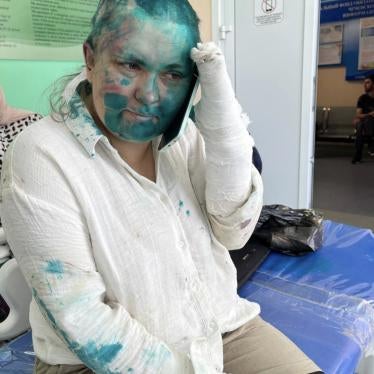The European Union should seize every opportunity to press Russia to end human rights abuses in Chechnya and other parts of the North Caucasus and ensure perpetrators are brought to justice, a coalition of leading human rights groups said today.
The European Council on Refugees and Exiles (ECRE), La Fédération Internationale des Droits de l'Homme (FIDH), Human Rights Watch, the Internal Displacement Monitoring Centre of the Norwegian Refugee Council (NRC), and Pax Christi Flanders called on the EU to implement a robust foreign policy toward Russia that prioritizes ending impunity for human rights abuses in Chechnya as key to preventing further abuses in the region. This will be the central message of a photo exhibit which opens tonight and a roundtable discussion that will follow tomorrow at the European Parliament.
“The EU must resist any inclination to relax its engagement with Russia,” said Annemarie Gielen of Pax Christi Flanders. “The EU really has the credibility and the mechanisms to insist that Russia make concrete improvements in the human rights situation in Chechnya.”
In the last three years, the European Court of Human Rights has found Russia responsible for grave human rights abuses in Chechnya, including executions, disappearances, and torture in 25 cases. In every case adjudicated to date, the court has found that Russia failed to conduct an effective investigation into the alleged abuses.
“The European Court rulings on Chechnya provide the EU with a unique platform for calling on Russia to end ongoing abuses in Chechnya and the North Caucasus and ensure accountability for past violations,” said Holly Cartner, Europe and Central Asia director at Human Rights Watch. “The EU has a responsibility to make Russia’s full compliance with the European Court’s judgments a high priority in all dialogues with Moscow.”
Although the armed conflict has subsided and parts of the capital, Grozny, have been rebuilt, serious human rights abuses continue to be perpetrated in Chechnya. Extra-judicial executions, enforced disappearances, and torture have also spread to other republics of the North Caucasus. Russia has failed to bring all but a few perpetrators to justice for these crimes.
“Reconstruction of parts of Grozny must not mislead the EU,” said Souhayr Belhassen, president of FIDH. “To ensure an end to ongoing human rights abuses, the EU should urge Russia to end impunity in Chechnya and Northern Caucasus by bringing to justice the perpetrators of all crimes committed today and in the past.”
Authorities are stifling civil society, independent media, and free expression across the North Caucasus. Only a handful of nongovernmental organizations are allowed to function in Chechnya and face frequent government harassment. Independent media have been banned. In neighboring Ingushetia, police and other government forces have arbitrarily detained and ill-treated journalists, human rights activists, and peaceful demonstrators in recent months.
“Although the number of disappearances and executions in Chechnya have decreased in recent years, the EU should not turn a blind eye to continuing abuses, including very serious pressure on human rights activists and journalists in the North Caucasus,” said Svetlana Gannushkina, chair of the Russian Civic Assistance Committee and guest speaker at tomorrow’s roundtable. “There can be no real discussion of progress in Chechnya so long as independent voices have no chance of making themselves heard.”
Thousands of residents of Chechnya displaced during the conflict continue to live without permanent housing, and many have been pressured to leave temporary accommodation centers in Chechnya and in other locations. Many of these internally displaced people (IDPs) who fled to other regions of Russia have been pressured to return to Chechnya.
“Local authorities throughout Russia are pressuring IDPs from Chechnya to return to Chechnya, even just to obtain a passport, which under Russian law any citizen should be able to obtain at his or her current place of residence,” said Christophe Beau, acting head of the NRC’s Internal Displacement Monitoring Centre. “Given the ongoing human rights abuses, forcing anyone to return to Chechnya at this time places them at serious risk of physical harm.”
Many IDPs choosing to leave the region and settle elsewhere in the Russian Federation regularly face serious discrimination and hostility, including physical violence.
“IDPs from Chechnya still struggle to lead a normal life in Chechnya and anywhere else they have tried to settle,” said Bjarte Vandvik, secretary-general of ECRE. “It is time for the EU to insist that Russia do its utmost to protect this very vulnerable population.”
The photo exhibition at the European Parliament includes the works of six journalists who have documented conditions in Chechnya and other regions in the North Caucasus. Journalists featured include Heidi Bradner, James Hill, Mikhail Galustov, Musa Sadulaev, Stanley Greene, and Thomas Dworzak. The photos will be on display at the European Parliament until April 11.
At tomorrow’s roundtable discussion, Svetlana Gannushkina will be joined by Tanya Lokshina of Human Rights Watch, Natalya Estemirova of the Chechnya office of the Russian human rights organization Memorial, and Arbi Chitaev, a petitioner to the European Court of Human Rights from Chechnya.







